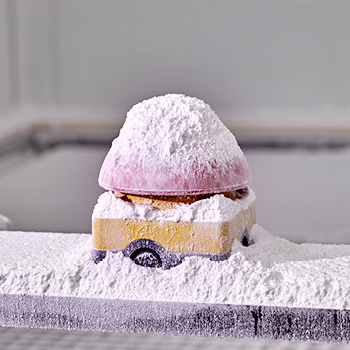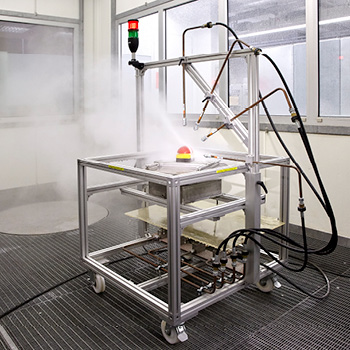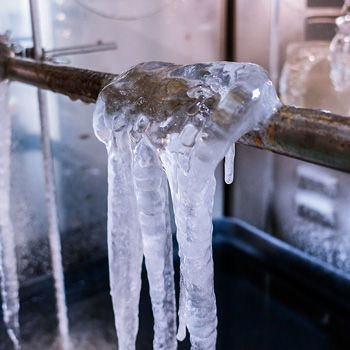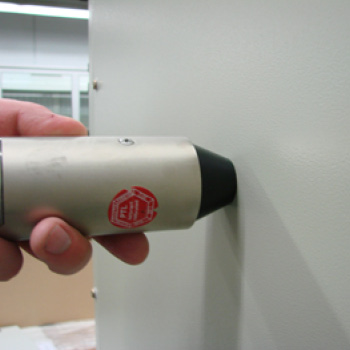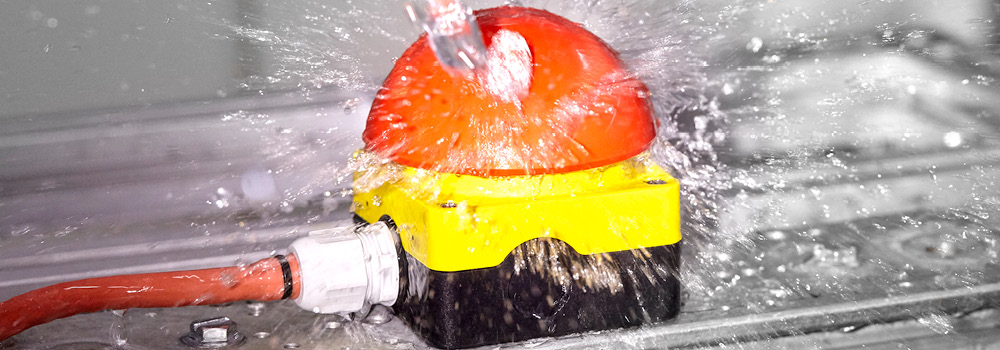
IP Degree of Protection Tests
In the case of enclosures and their installations, the protection against
In terms of enclosures and the components they contain, protection against
- access to hazardous parts
- solid foreign objects
- (damaging) ingress of water
is summarized under the term protection class.
This degree of protection is indicated with the code "IP" followed by two characteristic numerals. The first characteristic numeral indicates the protection of persons against access to hazardous parts and simultaneously provided protection of equipment against the ingress of solid foreign objects, while the second characteristic numeral indicates the protection provided by enclosures with respect to harmful effects on the equipment due to the ingress of water. Additional letters either describe access to dangerous parts or provide special supplementary information.
The testing systems used by I²PS for water and dust degree-of-protection tests are extremely spacious, making it possible to test large enclosures and distribution board systems.
|
Degrees of protection IP1X to IP6X define the protection provided against the ingress of solid foreign objects and contact with dangerous parts all the way to the protection provided against the ingress of dust.
Testing equipment::
- Calibrated probes
- Test chamber dimensions:
3 ,9 m x 2,5 m x 2,9 m (L x W x H)
| 1. Characteristic Numeral |
Meaning for the protection of persons | ||
|---|---|---|---|
| ISO 20653 | DIN EN 60529 | Against ingress of solid foreign objects | Against access to hazardous parts with |
| 0 | 0 | (non-protected) | (non-protected) |
| 1 | 1 | ≥ 50 mm diameter | back of hand |
| 2 | 2 | ≥ 12,5 mm diameter | finger |
| 3 | 3 | ≥ 2,5 mm diameter | tool |
| 4 | 4 | ≥ 1,0 mm diameter | wire |
| 5K | 5 | dust-protected | wire |
| 6K | 6 | dust-tight | wire |
|
Relevant Standards: DUTs: |
|
IP degree of protection tests with water are used to test resistance against the harmful ingress of water. Within this context, a vertically falling water drops test, splash water tests, and tests with water jets are used in order to determine whether enclosures, covers, and similar elements are leak-tight. With a test chamber size of 100 cubic meters, I²PS is able to perform IP degree of protection tests with water for IPX1 to IPX9k.
Testing equipment:
- Calibrated nozzles
- Test chamber dimensions:
- 3 ,9 m x 2,5 m x 2,9 m (L x W x H)
| 2. Characteristic numeral |
Against ingress of water with harmful effects | ||
|---|---|---|---|
| ISO 20653 | DIN EN 60529 | ||
| 0 | 0 | Non-protected | |
| 1 | 1 | Protected against vertically falling water drops | |
| 2 | 2 | Protected against vertically falling water drops when enclosure tilted up to 15° | |
| 3 | 3 | Protected against spraying water | |
| 4 | 4 | Protected against splashing water | |
| 4K | Protected against splashing water with increased pressure | ||
| 5 | 5 | Protected against water jets | |
| 6 | 6 | Protected against powerful water jets | |
| 6K | Protected against high-velocity water with increased pressure, specific for road vehicles | ||
| 7 | 7 | Protected against the effects of temporary immersion in water | |
| 8 | 8 | Protected against the effects of continuous immersion in water | |
| 9 | Protected against high-pressure/steam-jet cleaning, specific for foodstuff industry | ||
| 9K | Protected against high-pressure/steam-jet cleaning, specific for road vehicles | ||
|
Relevant Standards: DUTs: |
|
| Test parameters | Tests |
|---|---|
| Waterproofness | Drip, Rain, Hosedown, Submerson, Pressure, Oil Exclusion Tests |
| Dustproof performance | Dust Tests, Atomized Water Tests |
| Resistance against icing | External Icing Test |
| Resistance against corrosion | Indoor Corrosion Protection, Additional Corrosion Protection, Outdoor Corrosion Protection Tests |
| Verification of gaskets | Tensile Strenght and Elongation, Compression und Oil Immersion Tests |
| Verification of mechanical characteristics | Rod Entry, Misalignment Tests |
|
Relevant Standards: DUTs: |
|
Impact tests are used to test and classify (e.g., IK code) the protection of a metal or plastic enclosure against dynamic mechanical loads. Within this context, the corresponding impact energy is transmitted in a variety of manners depending on the standard being used, with a drop hammer, spring-operated impact hammer, and pendulum impact tester being some examples. In fact, the type of impact element that needs to be used is defined in detail in the relevant standard (material, shape, dimensions, weight, etc.). In addition to impact tests, drop tests (e.g., ball drop tests) from a defined height onto products with and without outer packaging can be performed the way they are described in a variety of testing and product standards.
Finally, we perform impact tests not only on components and devices, but also on specimens in order to determine the characteristic values of the corresponding material. Within this context, we particularly use Charpy and Izod impact tests, which measure energy absorption during an impact test with a pendulum impact tester on notched or unnotched specimens.
|
Relevant Standards: |



